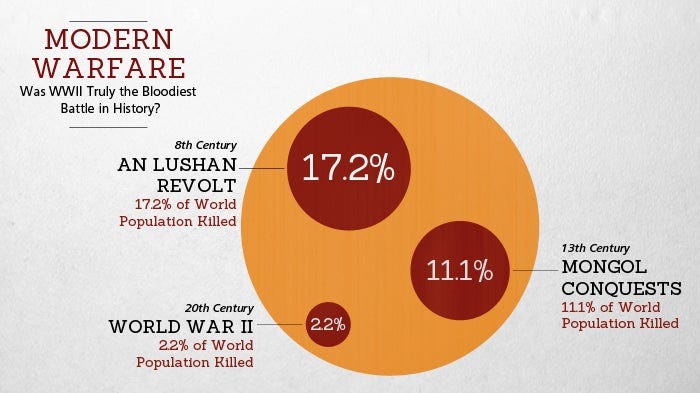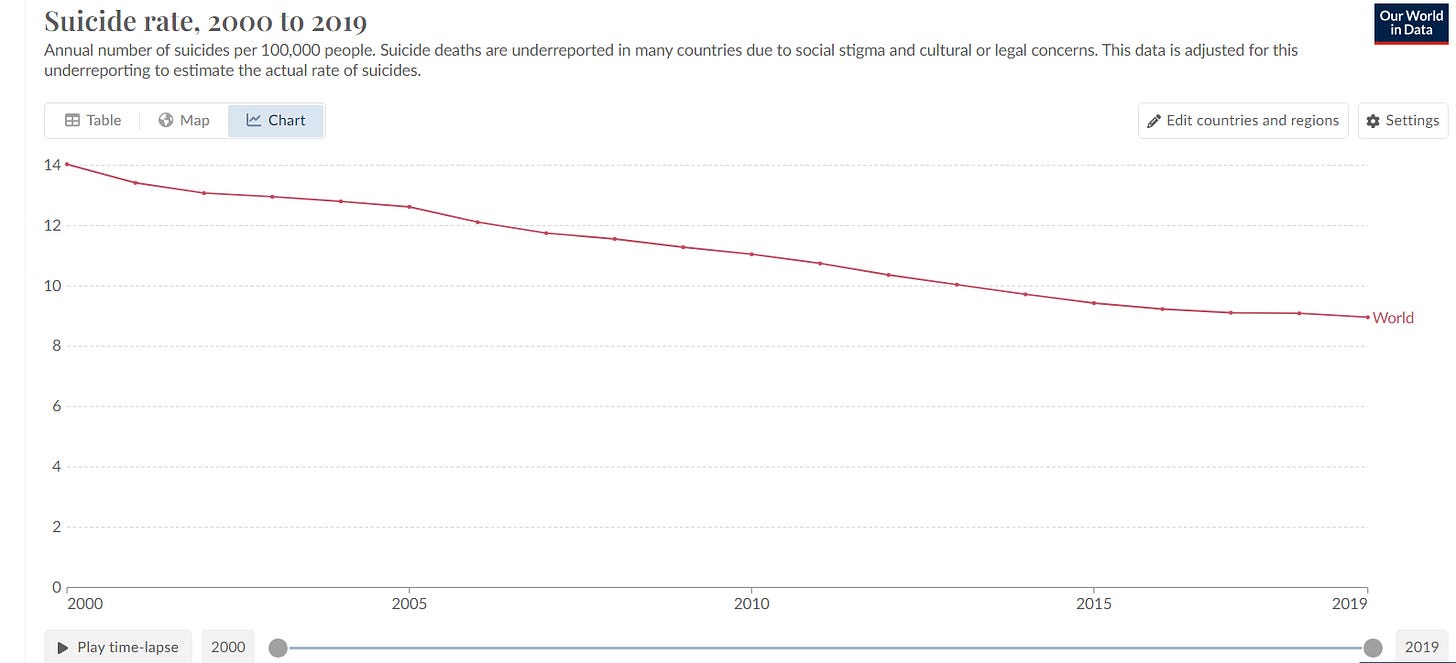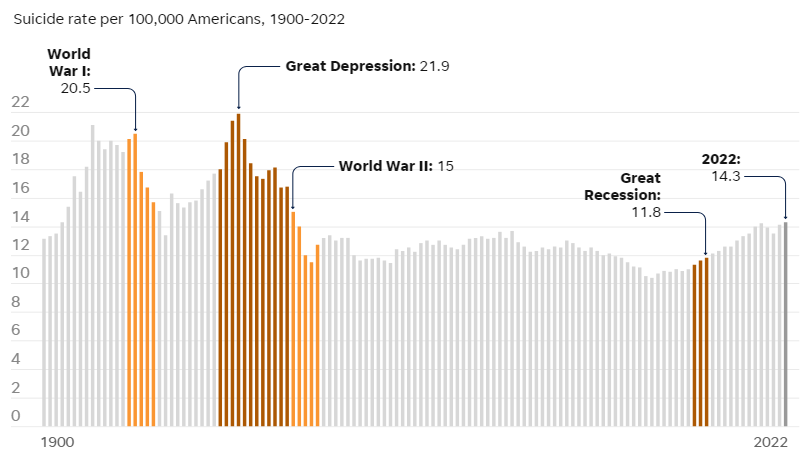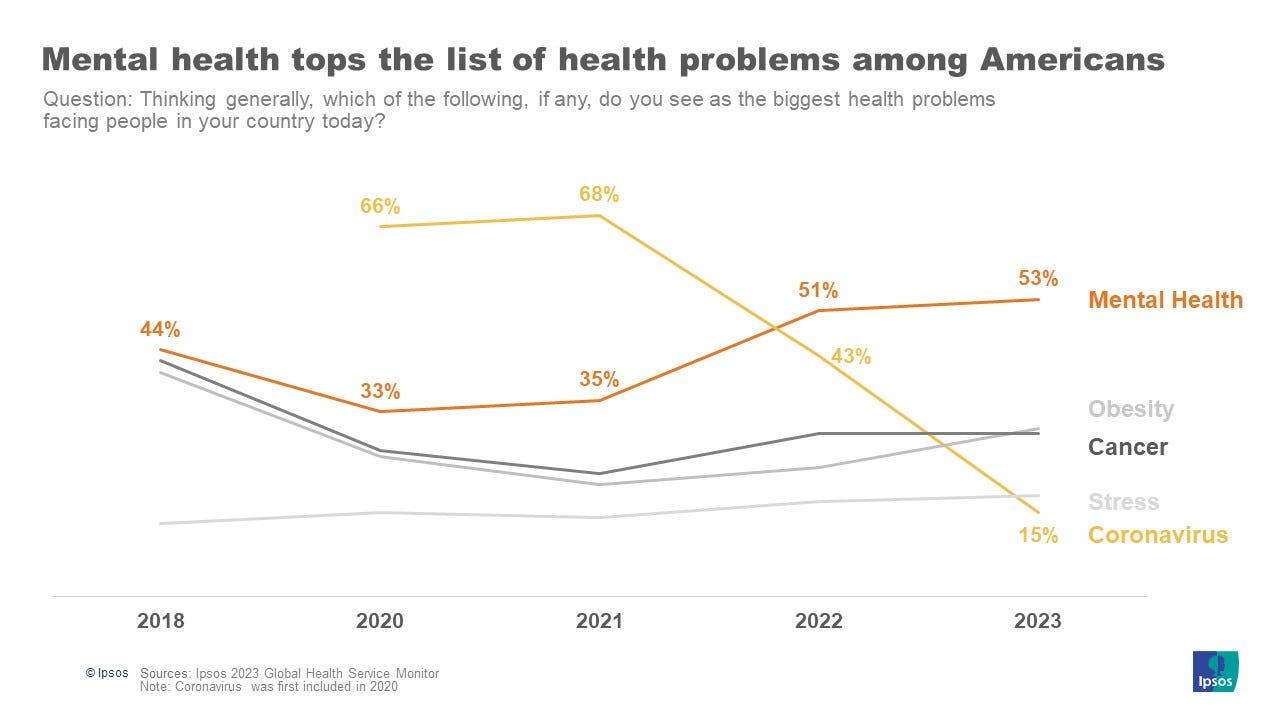Yes, most would grant that the majority of welfare determinants have improved, but same may argue that on some dimensions, the past is indeed better. I am of the opinion that the more I research, the fewer of these dimensions I can honestly agree with. But let’s take one that seems to be quite popular to trash on in the modern day, romanticized in the past, and currently a hot topic on Substack thanks to Jonathan Haidt’s The Anxious Generation. That is of course the issue of Mental Health.
If you aren’t convinced that the majority of welfare determinants have improved, keep reading. If you are, skip to the Mental Health heading.
To get the obvious out of the way, yes, the majority of welfare determinants have dramatically improved in the long run.
Violence, for example, has plummeted. Rates of homicide, domestic violence, and deaths from warfare have all been on a steady decline for the past two centuries or so, and are a small fraction of what they used to be for most of our species’ existence as hunter-gatherers. In general, the world is a more peaceful place.
I will get on with the other variables, but first a segue. Some may argue against this, they may scream “But the world wars! And terrorism! And gun violence!” Yes, an absurdly high amount of people were killed in the world wars, but that’s also because we have way more people nowadays! That’s why you have to look at the ratio, your probability of being killed in the street, your probability of being a victim of terrorism. It is the per capita measures that matter. And, looking at those measures, it is obvious that terrorist attacks and gun violence effects are completely swamped by the reduction in per capita violent deaths. As for World War 2, per capita measurements also reveal how overrated the conflict is in terms of mortality.
But what about about literacy? No shot. Real wages? Same story. Access to food? Our caloric intake blows away the past. Our average height would dwarf an English peasant. In terms of variety, the average middle-class pantry would be more exotic than the richest emperors of Rome. Oh and if you think all of this would cost us more? Think again. (you may argue that food is less healthy than it was in the 50s, and you might be right, but in the long run, it is much healthier than the gruel the average person (peasant) ate from 12,000 - 200 years ago)
Education, life expectancy, child mortality, deaths from disease, political and religious freedom, women’s rights, economic freedom, discrimination? C’mon! We can keep running through these, but let’s look at something less obvious.
Mental Health
Mental health, say the doomer. Well, this one seems pretty common in the discourse, and it’s also inconveniently one of the hardest to measure. Even worse, it’s also one of the most important, if not the most important determinants of welfare.
So let’s start with suicide rates. These might serve as a good proxy for the prevalence of severe examples of mental health among the populace. How are these doing? Similar to the other determinants.
And, comparing between different age brackets, the younger generation has been going steadily down. This is a good sign that the incoming generations are less susceptible to suicide. You might argue that deaths have gone down partly because our ability to save people post-attempt has increased. You may also argue that this graph doesn’t go back far enough. But this study on Europe shows that even with a timeline going back to the 1960s, including attempts, there is still no increase.
And yes, the United States is an outlier here, but don’t let that cloud your vision. Europe is progressing nicely, and the rest of the world is too. And, if you look at the U.S. in the long run, although it has worryingly been increasing, it is far lower than it was in the first half of the 20th century.
Drug use can often cause mental health problems, could it be that drug disorders have increased, and that is causing worsening mental health conditions? It’s hard to get numbers going back before the 1990s, but it is safe to say that the doomers would be correct that drug use has expanded in the last century. But if they are arguing that drug use has gotten worse over the past 30 years, then they would be wrong. (But American exceptionalism strikes again)
And what about the obvious, surveys of various mental health conditions, and seeing whether they go up or down over time? I could only find as far back as 1990, but it seems they have remained static since then. There was a brief increase during COVID-19, but this can be ignored, as it’s not indicative of long-term societal trends.
Though it’s hard to tell how mentally healthy people were back in say, the 50s, I’m not sure you could argue it was a better time in this respect, given if you had a disorder the conventional treatment was lobotomies and electro-convulsive therapy.
So is the world the best it’s ever been? It seems so. Doomers may point to mental health getting worse, but over the last three decades that’s false. They might pivot back to medieval England, and say “Fine, I’ll eat strictly oatmeal and cabbage, live in a much more dangerous place, and have a ⅓ chance of dying before my 3rd birthday because I know I would be happier! Individualism and capitalism have ruined our sense of community and well-being, don’t you know that medieval English villages spent 1/3rd of their year celebrating holidays?” Yes, the collective spirit of your deeply poor and uneducated English village might have more holidays than us, but it seems clear that our modern age of abundance, freedom, and safety trumps any small benefits of previous ages.
And if you think there is a stigma around mental health today, it would be productive to remind yourself that if you showed the same symptoms in the medieval era, you would probably be imprisoned in a madhouse, tortured, or burned at the stake, as your mental illness was most likely due to possession from the Devil.
Nowadays, we are so much better aware and accommodating for people with mental health conditions than at any other time in history. Mental health lingo is peppered throughout conversation nowadays, especially among my generation. (Gaslighting, mental health days, boundaries, trauma, etc) Grouping people under labels, a favourite pastime of humans, now includes not just race, gender, and nationality, among others, but also ADHD and autistic and anxious and neuro-divergent and much more. People will describe themselves as having various disorders, like anxiety or depression, as if they are talking to their therapist (which everyone also has nowadays) without a hint of embarrassment.
Now, an older gent might read this and say: “Not only are you trivializing mental health, but you also sound like a bunch of timid pushovers who constantly complain about being sad or lonely without doing anything about it.” This is unfair. Not because that isn’t true, for some of my generation, it is. But the majority are pretty emotionally conscious. We solve disputes and ingroup issues more effectively than other generations. We’re also very sensitive to other’s emotions, so in previous decades people might have felt terribly and told nobody, but comparatively, we love talking about it. You can’t be at a hangout and look even the least bit sad without someone asking, “are you okay?” and trying to help. Yeah, there are trade-offs. Some Zoomers burst into tears when they take a hard exam or can’t have fun at a party because they have panic attacks around too many people. But I guess time will tell whether we exploit our emotional intelligence to create more harmonious societies, or just crumble under the pressure.
Now back to the essay. This is probably why people have this intuition that “mental health has gotten worse” because we are 1) So much more aware of it, and 2) So much more accepting of it. Increased awareness and diagnosis of these conditions has probably, in no small part, led to the perception of worsening mental health, even if the actual prevalence has remained stable over time. It’s great that we have destigmatized it, and it’s great that it’s acceptable to talk about it openly, but an unfortunate side effect of this prioritization of mental health is that mental health never stops being talked about! Our intuition on how mentally healthy we are as a society has been seriously warped by this. And compounding these effects, mainstream media has a bias towards negativity, so the news will notice the increased awareness of mental health, and then select the mentally unhealthy stories, and the worst of those mentally unhealthy stories at that. If it bleeds, it leads. This selection bias in the news paints an even worse portrait of mental health. So intuition is really not the move here.
The reason for this is that humans like to be lazy as often as we can (energy-saving genes propagate!), especially about ideas like probability. So we use this trick called the availability heuristic, which creates mental shortcuts to assess the likelihood of events based on how easily examples come to mind. It’s easy to see how useful this would be for hunting bison or gathering berries, but in a modern society, there are way too many variables to account for besides quick examples that come to mind, so it’s usually harming our ability to have a good intuition on a complex issue.
Because we live in 2024, and information about mental health is more readily available than ever, negative examples quickly come to mind, more so than they would have in decades and centuries past. So, this little trick we humans use is the reason most of us are so pessimistic about mental health. If people were to actually look at the statistics, and not take lazy shortcuts, they would see there is no cause for alarm worldwide, and it seems that on more dimensions than not, there is cause for celebration and gratitude.
And, it also could just be because American mental health is so oddly bad compared to the rest of the world, and Americans have a chronically hard time remembering that the rest of the world exists.
Mental health seems to be by far the biggest health problem among Americans. But again, it is useful to look at the data, and see that increased suicides, drug disorders, and mental illness in general, is really a uniquely American problem, not a worldwide one. And even within America, most of our ideas on mental health are severely warped by the news and the present and ever increasing asymmetry between our evolutionary biology and the reality of society. The argument presented in this essay is not a slam dunk on the topic, for that, I would need more more robust data analysis. It is merely meant to change your probabilities, as I consider most to be overrating the issue.
So yes, there are good reasons for you to drop mental health in your box of optimistic welfare determinants, as it has steadily gotten better across the world, and will most likely continue to do so as the world becomes richer, safer, and more educated.







